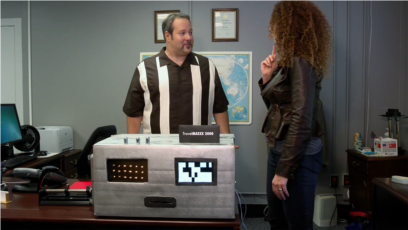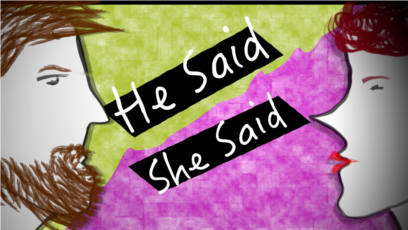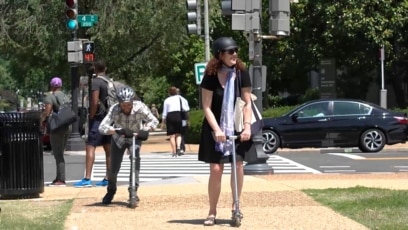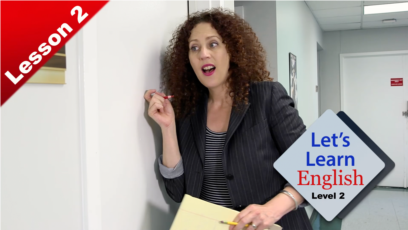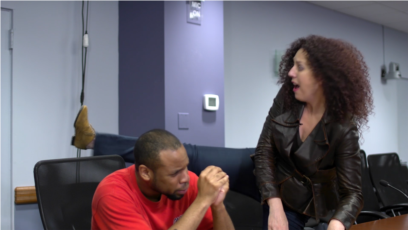Ms. Weaver asks Anna to team up with a person who is different from her. Who will she find?
Bà Weaver nói Anna hãy chọn một người khác tính cô ấy để cùng làm việc. Cô ấy sẽ tìm ai đây?
Anna: Ms. Weaver is giving new assignments out. I am ready to take on anything she gives me. Well, except reporting traffic from a helicopter. Wish me luck.
Professor Bot: I wonder what Anna’s new assignment will be? Professor Bot here! While you are watching, look for phrasal, or two-word verbs. Some stay together, like “go back” and some can come apart, like “give [assignments] out.” Good luck, Anna!
Ms. Weaver: So, as I said at the meeting last week, I have new
assignments for everyone at The Studio. Anna, you're good at asking
questions. So, I want you to go back to hosting and reporting.
Anna: That sounds great.
Ms. Weaver: You're also a team player. So, I want you team up with someone ...
Anna: That sounds even better!
Ms. Weaver: ... someone who is very "different" from you.
Anna: That sounds ... what do you mean "different"?
Ms. Weaver: Well, you are very cheerful, you're a people person. I want you to team up with someone who ... isn't.
Anna: Ms. Weaver, I will find that person.
Mimi: Excuse me. Are you using this chair?
Pete: Yes.
Anna: Pete, hi! Thanks for meeting me.
Pete: Sure. But I don’t have lots of time, Anna. I’m busy looking for work.
Anna: Pete, you can tear these want ads up and throw them away! I have good news!
Pete: Anna, I was working on that crossword puzzle.
Anna: Oh. Sorry. Sorry. Pete, forget about the crossword puzzle. I have a job offer for you!
Pete: I'm listening.
Anna: My boss wants me to team up with someone to host a talk show.
But the person must be different from me. So, I thought of you.
Pete: Different from you? What do you mean?
Anna: I'm sorry, Pete, I don't have time right now. Here's my boss's address. Your interview is tomorrow morning at 10 am.
Pete: But what do you mean “different”?
Anna: Just be yourself, Pete. Just be yourself.
Professor Bot: Did you find any two-word verbs? Here’s one example. Pete can throw the wants ads away! Throw away is a two-word verb.
Ms. Weaver: Thanks for coming in, Pete.
Pete: Thanks for the opportunity, Ms. Weaver.
Ms. Weaver: I need to find out if you have the skills for this job. And I want you to be completely honest.
Pete: Okay.
Ms. Weaver: First, let's talk about your personal skills. Pete, are you a people person?
Pete: Well, okay, sometimes I think people talk too much.
Ms. Weaver: Pete, what work of yours are you most proud of?
Pete: Last year, I locked myself in a cabin and wrote a book. I didn't speak to anybody the entire time! It was the best two months of my life.
Ms. Weaver: Okay. I think I’ve heard enough.
Anna: Hey! Hey, Pete, how was the interview with Ms. Weaver?
Pete: Well, she said I was grumpy and not good with people.
Anna: And … ?
Pete: And, I got the job!
Anna: I knew it! Congratulations! Let's go celebrate.
Pete: Okay!
Professor Bot: Did you find more two-word verbs? Here is the list.
|
give out
|
find out
|
|
take on
|
tear up
|
|
go back
|
throw away
|
|
team up
|
come in
|
Động từ gồm hai phần (Two-part verbs)
come in - phrasal verb. to enter a place
find out - phrasal verb. to learn (something) by making an effort
give out - phrasal verb. to give (something) to many people or to hand out (something)
go back to - phrasal verb. to return to a person, place, subject, or activity
take on - phrasal verb. to begin to deal with (something, such as a job or responsibility)
team up- phrasal verb. to join with someone to work together
tear up - phrasal verb. to completely destroy (something) by tearing it into pieces
throw away - phrasal verb. to put (something that is no longer useful or wanted) in a trash can, garbage can, rubbish bin
Từ ngữ mới (New Words)
cabin - n. a small, simple house made of wood
cheery - adj. having or causing happy feelings
crossword puzzle - n. a puzzle in which words that are the answers to clues are written into a pattern of numbered squares that go across and down
grumpy - adj. easily annoyed or angered, having a bad temper or complaining often
helicopter - n. an aircraft that can stay in the air without moving forward and that has metal blades that turn around on its top
host - v. to talk to guests on a television or radio show
offer -n. the act of giving someone the opportunity to accept something
lock - v. to fasten (something) with a lock
people person - n. a person who enjoys or is particularly good at interacting with others
personal skills - n. (interpersonal skills) the skills used by a person to interact with others properly
team player - n. someone who cares more about helping a group or team to succeed than about his or her individual success
want ad - n. a notice in a newspaper,
magazine, or website that lets people know about something that you want
to buy or sell or a job that is available
wish me luck - expression. asks someone to say that they hope you will have success
Sách lược học tập (Learning Strategy)
Setting a goal is important when beginning to study. Learners who set goals put a powerful idea into their own minds: "I will do this by this time."
For example, "I will improve my English speaking skills so I can talk
with a friend for five minutes in English by next September."
In this lesson, Anna sets a goal: she wants to find someone
who is different from herself. Ms. Weaver asked Anna to team up with
someone for her new show. Anna asks different people first. Then, she
asks Pete, and he says he will talk to Ms. Weaver. She met her goal of
finding the right person for the job.
How about you? What is your goal for learning English? How will you use Let's Lean English Level 2
to help meet your goal? Think of what you want to do, and when you will
be able to do it. Write to us in the Comments section or send us an email.
Bài kiểm tra Nghe (Listening Quiz)
See how well you understand this lesson by taking a listening quiz. Play each short video, then choose the best answer.
Quiz - Let's Learn English Level 2 Lesson 2
Start the Quiz to find out



































































